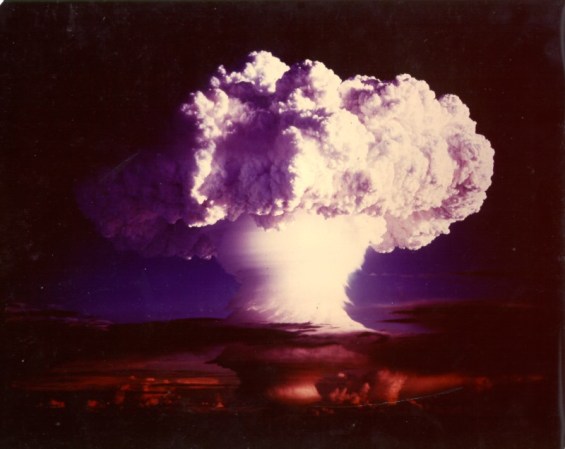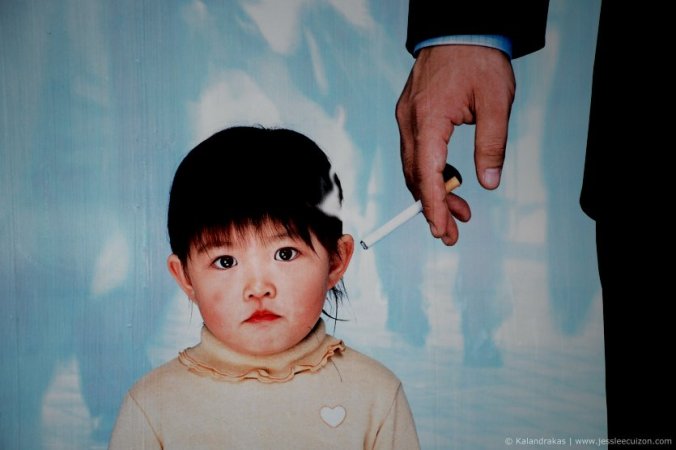

In 1950, General Douglas MacArthur asked the president for permission to drop 34 atomic bombs in the Korean War. While his request was denied, he continued to defend the proposal for years after, arguing in a 1954 interview that “between 30 and 50 atomic bombs” would have brought the conflict to a hasty conclusion.
At that time, few of our military or political leaders grasped the implications of nuclear war. President Truman called the atomic bomb “the greatest achievement of organized science in history.” President Eisenhower said he saw “no reason why [atomic bombs] shouldn’t be used just exactly as you would use a bullet or anything else.”
Scientists, however, had a very different take.
Robert Oppenheimer, widely regarded as the father of the atomic bomb, said that, in considering the widespread use of the weapon, “we have made a very grave mistake.” Other physicists echoed this sentiment. Niels Bohr spoke of the “terrifying prospect” of a nuclear arms race. Albert Einstein warned against our “drift toward unparalleled catastrophe.”
At the time, these exhortations struck many as out of touch with the national mood. Scientists were, after all, arguing limits on the country’s military might. But despite these reservations, policymakers listened. Today, few in Washington would support a preemptive nuclear strike.
As our country grappled with how to handle atomic weapons, scientists served an essential role as guardians, as watchmen, as sentinels — to borrow the term of Harvard science historian Naomi Oreskes. Scientists during the Cold War possessed a unique understanding of nuclear weapons and felt a responsibility to speak out. They emerged from their labs and lecture halls to sound the alarm about nuclear war.
What happens when no one listens to the alarm?

Today, scientists and their work are under attack. Lawmakers across the country have ignored the judgment of science. Many have exaggerated the risks of genetically engineered foods, fabricated a link between vaccinations and childhood autism, or dismissed the threat of climate change. It’s up to researchers, and the millions of Americans who depend on their work, to stand up for science.
Tomorrow, tens of thousands of people will gather in Washington — and hundreds of other cities — to march for science. Organizers aim “affirm science as a democratic value,” and protect the right of scientists to sound the alarm. Some researchers have balked at the idea to marching. But Oreskes says that advocacy is part of the job, and it always have been. Just ask Einstein, Bohr, or Oppenheimer.
“We want to do the work that we were trained to do, the work that we love. But we’re here because our science, our work, is under attack. And we have realized that we can no longer sit on the sidelines assuming that someone else will protect us,” she said at a rally during the annual meeting of the American Association for the Advancement of Science in February. “It’s not political to defend the integrity of facts.”

“We did not politicize our science. We did not start this fight,” said Oreskes. “Our science has been politicized by people who are motivated to reject facts because those facts conflict with their worldview, their political beliefs or their economic self-interest.”
Climate science offers a stunning example. In 1965, noted physicists Roger Revelle and David Keeling warned President Johnson that carbon pollution threatened to irreparably damage the Earth’s climate. “Through his worldwide industrial civilization,” they wrote, “Man is unwittingly conducting a vast geophysical experiment.”
In the last half-century, the science has only become more compelling and the problem more urgent. Today, scientists at NASA, NOAA, and other government agencies are sounding the alarm about climate change. They have faced tremendous hostility from members of Congress, who have cast doubt on climate science, tried to restrict the use of scientific findings, and pushed to cut funding for climate research.
For many scientists, it’s baffling that their work has become politicized. “When you have an established, scientific emergent truth, it is true whether or not you believe in it,” said Neil DeGrasse Tyson in powerful video released this week. “And the sooner you understand that, the faster we can get on with the political conversations about how to solve the problems that face us.”

Oreskes contends that scientists shouldn’t just focus on facts. They should also talk about their values. For researchers, that means defending reason and scientific integrity. It means urging our elected leaders to protect lives threatened by disease, pollution, and climate change. It means speaking up.
“[Climate scientists] who have been attacked have not been attacked because they did something wrong. They have been attacked because they did something right. And that something was science,” Oreskes told the crowd at the Boston rally. “The key thing for all of us now is to stand together, to be prepared to defend our colleagues if and when they need to be defended.”
Tomorrow, thousands of Americans will take to the streets, firm in their belief that science is a pillar of democracy. Our founders would no doubt agree: James Madison said the “advancement and diffusion of knowledge is the only guardian of true liberty.” Thomas Jefferson once described freedom as “the first-born daughter of science.” Oreskes shares their view.
“It is not political to stand up for science,” she said. “It may be political to defend the concept of a democracy composed of citizens governed by reason and truth. But if it is, that is a politics that I, for one, am proud to embrace.”
Jeremy Deaton writes for Nexus Media, a syndicated newswire covering climate, energy, policy, art and culture. You can follow him at @deaton_jeremy .















